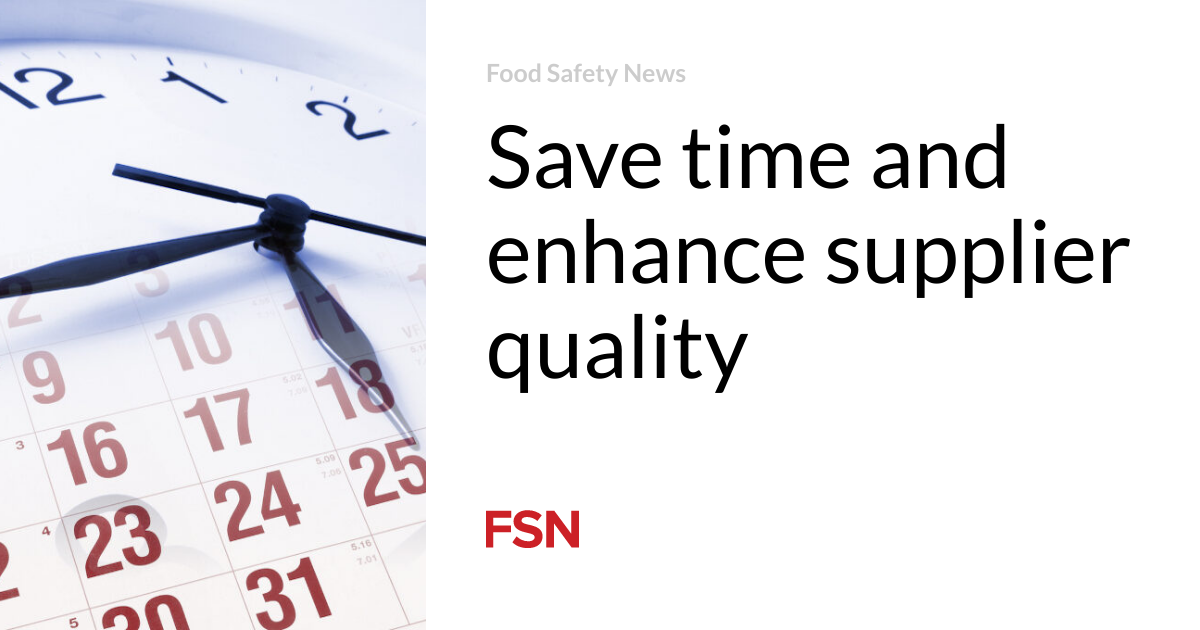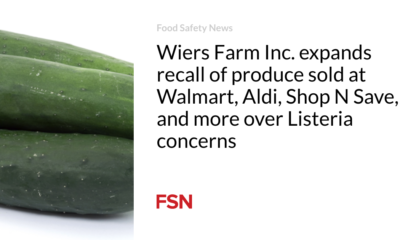Food
Save time and increase supplier quality

— ADVERTORIAL —
In the globally connected agricultural and food production industries, ensuring supplier quality is of utmost importance to us as end users. Traditionally, ensuring supplier quality standards were met was, and still is, a time-consuming and labor-intensive task for many, involving endless supplier lists, multiple Excel sheets and a lot of administrative work. The advancements in vendor quality software solutions such as FOSS IQXtransform this landscape.
What is supplier quality?
In its most basic terms, Supplier Quality refers to the process of ensuring that all materials and services provided by suppliers meet specified quality standards. This includes strict controls, audits and approvals to prevent problems that could affect the final product. They are all critical because high supplier quality is critical to maintaining product integrity, customer satisfaction and compliance with regulatory standards. Poor supplier quality can lead to product recalls, legal issues and damage to a company’s reputation – examples of which abound!
The traditional approach: Excel Sheets and administrative overload
The traditional approach to supplier quality management often involves maintaining extensive supplier lists, both in physical form, through on-site documentation and simple Excel spreadsheets. This method was and largely still is not only time-consuming, but also prone to errors and inefficiencies.
Relying on simple Excel sheets, Word documents and everything in between to track supplier information and quality metrics, while useful for many small manufacturers and suppliers, has also led to significant administrative burdens. Numerous files collected over the years may be scattered across several remote computers, some of which are no longer in use. Mistakes happen and the consequences can be disastrous. To avoid potential disasters, it is crucial to consolidate all relevant information and ensure exclusive collaboration with clear and compliant suppliers.
On the other hand, human resources that can improve quality processes, assist with supplier negotiations, or conduct audits are tied up in paperwork. The inefficiencies of paper-based systems often result in delayed approvals, outdated product documentation and incomplete risk assessments.
Imagine an auditor asking a specific supplier to fill out a questionnaire from eight years ago and then finding the document in a closet on the other side of the country – not very convenient or efficient!
Modern supplier quality management systems eliminate the need for paper-based processes. Platforms such as FOSS IQX centralize supplier information, making it easily accessible and manageable. By freeing up staff from administrative tasks, companies can use their resources more effectively.
Trust the process
Creating a detailed map of all suppliers helps understand the breadth and complexity of the supply chain. This map should include important details about each supplier, such as location, products supplied, and compliance status.
Regular supplier audits are essential for maintaining high standards. Audits should evaluate suppliers’ quality management systems, manufacturing processes and compliance with regulatory requirements. Approval of suppliers involves a thorough evaluation of their capabilities and the quality of the materials they supply. This process ensures that only high-quality suppliers are part of the supply chain. By not carrying out these audits, substances such as allergens may appear in supplied materials. Failure to identify and remedy quickly can lead to serious health risks and legal consequences.
The reality is that there are no one-size-fits-all solutions for creating the perfect supplier quality plan. Every organization is different and adheres to different rules, regulations, customers and suppliers. However, a good starting point is to invest in dedicated personnel for supplier quality management so that focused efforts can be made to maintain high standards. These individuals can oversee the entire process, from mapping to vetting and approving suppliers, with the goal of reducing and mitigating potential issues and creating a robust process from start to finish.
Furthermore, effective supplier quality management requires close collaboration with purchasing teams. By ensuring that purchasing processes include quality controls and certifications, high standards for materials and services can be maintained. Having a centralized supplier information system provides a comprehensive view of all suppliers, which helps track compliance, performance and any issues. Sharing supplier quality information between teams ensures everyone is informed and on the same page, allowing for quick problem resolution and consistent quality. Compliance with standards such as ISO certifications is critical, and modern systems can help track and ensure compliance, making it easier to meet regulatory requirements.
Overall, a robust document management system ensures that all necessary documentation is readily available, including supplier certifications, audit reports and quality metrics. Modern quality management systems for suppliers, such as as FOSS IQXprovide robust compliance and quality control tools. These systems offer features such as automated checklists, digital documentation and real-time reporting.
Software solutions save time and costs
The most important outcome of bringing software solutions into your supply management system is eliminating administrative nightmares, labor waste and resource-intensive activities. Investing in a software solution such as FOSS IQX can save time, reduce administrative burden and costs, and improve overall quality for consumers. Software solutions provide power, overview and visibility across the entire supply chain. By using such a solution, companies can hire dedicated staff, support rigorous audit and approval processes, and ensure a robust and reliable supply chain from start to finish.
(To sign up for a free subscription to Food Safety News,Click here)













